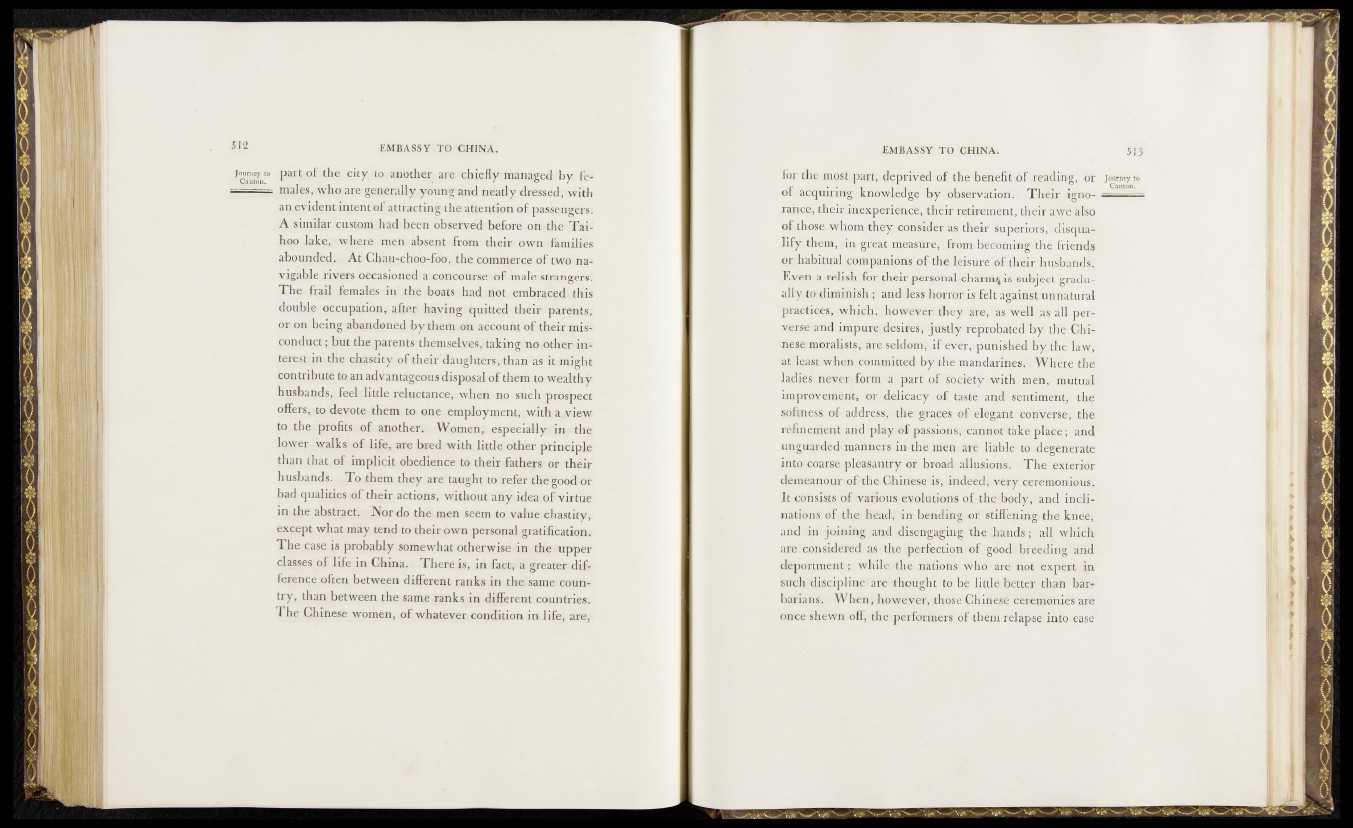
Journey to
Canton. part ©luthe city;to. another- are ch}eflyt managed by fgi
maleSjwho^.ege&grally ybuug and neatly^Kffssed^ith
aneyident intentioEattracbmg^iHg^aftipAom'i ofr passenger®t
A . sinr^fi^ustbm [harhbeen observedfc-befbrb ^ora®|iie'>T5ar-
boo J a k e ,w :kerq men absent from, their pwmdbmiMes
abounded.* At Ghau-choo-ioo, the commerce of two*navigable
rivers bccasioned|a concourse ©frmale^straingefsi
The frail ifemafeun Al^rboats; bad pot. embracedi this
duujffeqoecupatibn, after having ^uitted ihekiipar&nts^
qnen Iheing/afeandbned bv them on a ^ o u n to f their.rwika
conduct; But the parents themselves, taking not©thanin-»
tertest in the chastity sol their; daughters, thanlas^itsmighit
contribute tb an:ad vantageous disposal of them to:w,ealthy
husbands, Feel dittle reluctance,;, w h e n b b ; ;piirrteipp«t
offers,-to.deyote-ihem to- one employ m«nt|i with a^vi^we
tsjpthe-profits^of another. Women, «spbcraPly^rantlie
lower walks of life, are bred with little other principle
than that of implicit obedience to their fathersronrtM-k*
husbands. To them they are taught toaJefer the good-or
bad qualities of their actions, without anyidea-of virtug
in the abstract. Nor do th e men seem to value:*ehastityv
except what may tend to their own personal gratification;
The case is probably somewhat otherwise in the upper
classes of life in Ghina, There is, in face, a greats difii
leiience often between different ranks in the, same coun-
tjy, than between the same ranks in different countries.
The Chinese women, of whatever condition in life, are,
for t'btqjpqs^partjplpprlvedWof (vhe'benefit of reading, or
f&acqasirinigt'knopl^lfge^byr obserVationd ’Their igno-
Fl6p^"fhc;ir inexperience<,%Beirf retirements their aWefalSsp
q£ tbpsp whe'h^tbi^finsider.■-a«',their; superib#^|isqua-
M|lphem, in grpat> measure-, -frcSifajbeqbjning^b^ffien^}
PJl h abi%ali i^cpa pani® ns- pf the^Misure^th'iip'bifeband^s
Even airelishff©\ri|beibpkr sonal? s h ar is;'&u!bie|bgrftdulofdiaaatini'sh
§ and' kssA'dirb'^ifcfe®^gainst unnatural
pra@>iees,5 wh jjf pWj^ySrftlfe well ^ ‘iail'pef-
-'Ume 'and' itapur^fesires srjju%1^ 1i|e^M©b!aie% By the{jChi-
»Q§e>mpralis$§y puni3hedi^y the law;
afedifta'St! Wihpn-<com mitted by tb e-mandarines-. -. Where: the
1 adies<>nis-sfp.l;'>fpriM -Mftp'fTttf»society \vit-hnmen, mutual
impipv^^faty %»d|eli^c5^®i6'“t^ffe-,and ;se.ntiment,c t-bb
spfbnpgs? of sadd^es^|.>tBp^gia1ojgs-;®l^elegah't:rj€on-&i^e^ the
rMfeejbent and-play of -pa.^sibn«, rcin-not takferplappl; qandr
unguard^dtaprqans^ imthblmen.-arp - Ifebl^fe'jdeg-euerate
in't^goarspj pleasantry or broad •.allugipja^. -.'Thepokteridr
depaaiiournof -th e;C|h irije t§d&, indp'ed^*^el^teergmotM©J}it
Itconsisit^pf various evoiiafci©ns- ofjith-^bpidyd.and inelij
naiticm»sr.of .-tfej bead, i n .hen'dfpgy.pif s tiffenin,g. tjhe kiip$^
aied in -joiapingirkndtfii<^^fi^fai-g-'t'he;ifepd^-ffa.li Which
ace 'ponsidergd as ? the ’perifepjf@n'Tbblg^4^tef|eyirf^and
deportment; w h ll^ lh c natiQhsi\^p>^MtpJ^?x<peilb;:^Ei
such disciplimefa?B#th<#ght to-bb; 1 i 111 erb e ttpy*-'than’ barbarians.
Wheny however-, -fehose'Chinese ceybmphieS(aifb
once-shewn offyithe^pcrfonfrers^nf^thehurelapse ln$biease
Jourpeyto
Canton. |